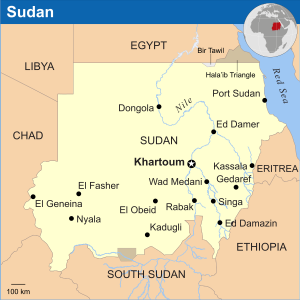
UBA, South Sudan (Morning Star News) – A court in Omdurman, Sudan on Wednesday (April 11) charged four Christians who defended church property from a takeover by a Muslim business interest, sources said.
Azhari Tumbara, Muna Matta, George Adam and Kudi Abderhman last year tried to keep authorities from seizing Sudan Presbyterian Evangelical Church (SPEC) property in Khartoum. Judge Adam Babiker charged the Christians with causing physical harm to police and supporters of a Muslim businessman who tried to take control of church school property in April 2017, Yahia Abdelrahim Nalu, SPEC moderator, told Morning Star News.
If found guilty under Article 142 of the Sudan Penal Code, the four Christians could be sentenced to a fine and a prison term of up to six months, said Attorney Adam Abu Anja, their legal counsel. Anja said he doubted they would receive the maximum sentence.
“I am confident – the charges are not that serious,” Anja told Morning Star News. “We have enough witnesses that, if they are convicted, they might be fined, that is all.”
A verdict could come at the next hearing on Monday (April 16).
On April 3, 2017, church elder Younan Abdullah died from injuries sustained in the raid by authorities and the Muslim business interest’s supporters on the school in Omdurman, across the Nile from Khartoum. Abdullah, an elder with Bahri Evangelical Church, died in a hospital after being stabbed while he and others were defending women at the Evangelical School of Sudan, SPEC sources told Morning Star News.
He is survived by his wife and two young children.
Acquitted
At the same hearing on Wednesday (April 11), the judge cleared five church leaders accused in the church takeover case, including Pastor Nalu.
“Five of us were freed for lack of evidence,” Pastor Nalu said.
Pastor Nalu, Pastor Idriss Kartina, Pastor Zachariah Ismael, elder Bolus Tutu and Salim Hassan were acquitted.
On Feb. 5 a court in Sudan fined seven church leaders who fought the takeover of the school in Omdurman for “objection to authorities,” a church leader said. The court fined SPEC elder Yohanna Tia 5,000 Sudanese Pounds (US$275).
Tia was one of 26 church leaders who appeared in court over a two-seek span in the case. Seven church leaders were ordered to pay fines of 2,500 Sudanese pounds (US$137) each, and 19 were freed for lack of evidence, according to Pastor Nalu.
Two pastors—Dawoud Fadul, SPEC moderator, and Pastor Kartina—were also fined 2,500 Sudanese pounds each. Church elders Adam George, Bolus Tutu and one identified only as Azhari were also fined, along with school director Ustaz Dauod Musa Namnam.
On Aug. 15, 2017, police raided Pastor Nalu’s home and another belonging to SPEC leader. They evicted the families of Pastor Nalu and Sidiq Abdalla, a SPEC pastor who has two children, ages 8 and 10. Pastor Nalu has a 1-year-old boy.
The action was considered part of the government-aided bid by Muslim businessman Hisham Hamad Al-Neel to take over church property. Police told the pastors they were carrying out a court order.
Leadership of SPEC remains in the hands of government-appointed committee members even after a court ruled in November 2016 that the appointments were illegal, sources said.
The Evangelical School of Sudan is one of several SPEC schools throughout Sudan.
In its campaign to rid the country of Christianity, church leaders say, Sudan has designated at least 25 church buildings for destruction.
Harassment, arrests and persecution of Christians have intensified since the secession of South Sudan in July 2011. The Sudanese Minister of Guidance and Endowments announced in April 2013 that no new licenses would be granted for building new churches in Sudan, citing a decrease in the South Sudanese population.
Sudan since 2012 has expelled foreign Christians and bulldozed church buildings on the pretext that they belonged to South Sudanese. Besides raiding Christian bookstores and arresting Christians, authorities threatened to kill South Sudanese Christians who do not leave or cooperate with them in their effort to find other Christians.
Sudan fought a civil war with the south Sudanese from 1983 to 2005, and in June 2011, shortly before the secession of South Sudan the following month, the government began fighting a rebel group in the Nuba Mountains that has its roots in South Sudan.
Due to its treatment of Christians and other human rights violations, Sudan has been designated a Country of Particular Concern by the U.S. State Department since 1999, and the U.S. Commission on International Religious Freedom recommended the country remain on the list in its 2017 report.
Sudan ranked fourth on Christian support organization Open Doors’ 2018 World Watch List of countries where Christians face most persecution.
Become a Christian News Network Supporter...


